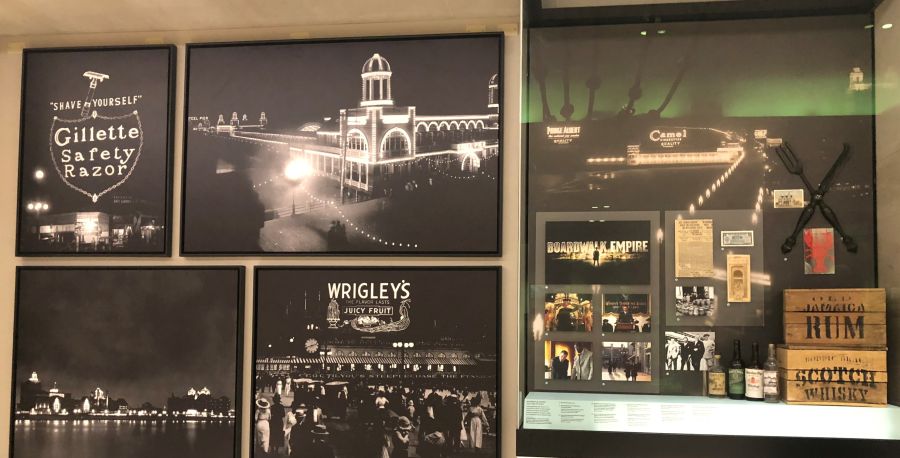Boardwalk Empire: Fact and Fiction in the Roaring Twenties
This display has been archived as of July 2022 and is no longer on display at the exhibit.
This display has been archived as of July 2022 and is not on display at the exhibit!

HBO presented the show on TV from 2010 to 2014. It was loosely based on the book, Boardwalk Empire, by Nelson Johnson, about the Prohibition era in Atlantic City.
Nucky Who?
Enoch Lewis "Nucky" Johnson was an Atlantic City political boss and racketeer who unofficially ran the Republican political machine that controlled Atlantic City and Atlantic County from the 1910s to the late 1930s. Born in 1883 in Smithville, New Jersey, "Nucky" (a nickname derived from his first name) was allegedly involved in promoting bootlegging during Prohibition, illegal gambling activities and prostitution.
In the HBO series, Nucky - played by actor Steve Buscemi - is named Nucky Thompson. The name was changed to reflect that the character was only loosely based on the real-life man.
The 1920s in Atlantic City
What were Americans doing in the 1920s? Dancing the Charleston, listening to jazz, and watching Rudolph Valentino at the movies. In spite of Prohibition, which made it illegal to make or sell liquor (including beer and wine), Americans drank anyway, going to secret clubs (or speakeasies) or making "bathtub gin" at home.
The unique new musical form called jazz was so important to the 1920s that the period is sometimes called the Jazz Age. Jazz served as the background music for this period, playing in nightclubs, on Broadway, as well as at private parties, and it drew New Yorkers to Harlem, the heart of African American culture during the 1920s.
Like jazz music, motion pictures were also more widely accepted during the 1920s as they moved out of working-class storefront nickelodeons into impressive movie palaces which attracted a more middle-class audience. In addition, the movies themselves illustrated the values of modern America at the same time as it reinforced traditional middle-class values.
The society of the 1920s was at odds with itself; people of the older generations and the middle class still clung to the Puritan ethic, while the younger generation had vastly different attitudes and morals. Young women rebelled against the previous generation, cutting their hair short and shortening their hemlines and wearing makeup. Decadent party goers, both the flappers, and their male counterparts, the flaming youth, demanded access to the alcohol that was accessible to the very well connected, and thus the demand for alcohol, which had never really disappeared, instead increased.
In Atlantic City, during Prohibition, the power of Atlantic City’s boss, Enoch “Nucky” Johnson’s reached its zenith. Prohibition was effectively unenforced in Atlantic City, and, as a result, the resort's popularity grew further. The city called itself “The World's Play Ground.” Most of Johnson’s income came from the percentage he took on every gallon of illegal liquor sold, and on his gambling and prostitution operations in Atlantic City. Johnson was quoted as saying:
"We have whiskey, wine, women, song and slot machines. I won’t deny it and I won’t apologize for it. If the majority of the people didn’t want them they wouldn’t be profitable and they wouldn’t exist. The fact that they do exist proves to me that the people want them.”
Nucky’s Empire
What would you have seen if you walked the streets of Atlantic City in the 1920s?
- More than 1,200 hotels and boarding houses, including Nucky’s own residence in the Ritz Carlton Hotel
- 21 theaters, including the Globe, Apollo, and Woods, showing 168 shows annually
- Numerous nightclubs, including Babette’s, the Paradise Club, and the Cliquot Club
- The first Miss America Pageants, which started in 1921
- The construction of Convention Hall, now known as Jim Whelan Boardwalk Hall, from 1927-1929
- 99 trains arriving daily in the summer months
- 5 ocean piers with hours of entertainment
- 4 newspapers (two dailies, one Sunday and one weekly)
- 3 country clubs
- 3 airports